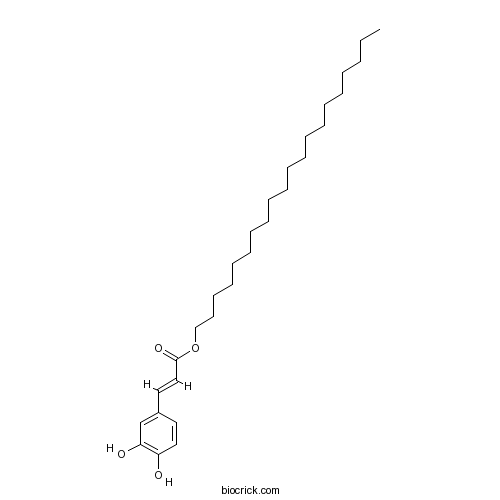Eicosanyl caffeateCAS# 28593-90-0 |

Quality Control & MSDS
3D structure
Package In Stock
Number of papers citing our products

| Cas No. | 28593-90-0 | SDF | Download SDF |
| PubChem ID | 5320238 | Appearance | Powder |
| Formula | C29H48O4 | M.Wt | 460.69 |
| Type of Compound | Phenylpropanoids | Storage | Desiccate at -20°C |
| Solubility | Soluble in Chloroform,Dichloromethane,Ethyl Acetate,DMSO,Acetone,etc. | ||
| Chemical Name | icosyl (E)-3-(3,4-dihydroxyphenyl)prop-2-enoate | ||
| SMILES | CCCCCCCCCCCCCCCCCCCCOC(=O)C=CC1=CC(=C(C=C1)O)O | ||
| Standard InChIKey | LTSJTDDQUOUKJT-XTQSDGFTSA-N | ||
| Standard InChI | InChI=1S/C29H48O4/c1-2-3-4-5-6-7-8-9-10-11-12-13-14-15-16-17-18-19-24-33-29(32)23-21-26-20-22-27(30)28(31)25-26/h20-23,25,30-31H,2-19,24H2,1H3/b23-21+ | ||
| General tips | For obtaining a higher solubility , please warm the tube at 37 ℃ and shake it in the ultrasonic bath for a while.Stock solution can be stored below -20℃ for several months. We recommend that you prepare and use the solution on the same day. However, if the test schedule requires, the stock solutions can be prepared in advance, and the stock solution must be sealed and stored below -20℃. In general, the stock solution can be kept for several months. Before use, we recommend that you leave the vial at room temperature for at least an hour before opening it. |
||
| About Packaging | 1. The packaging of the product may be reversed during transportation, cause the high purity compounds to adhere to the neck or cap of the vial.Take the vail out of its packaging and shake gently until the compounds fall to the bottom of the vial. 2. For liquid products, please centrifuge at 500xg to gather the liquid to the bottom of the vial. 3. Try to avoid loss or contamination during the experiment. |
||
| Shipping Condition | Packaging according to customer requirements(5mg, 10mg, 20mg and more). Ship via FedEx, DHL, UPS, EMS or other couriers with RT, or blue ice upon request. | ||
| Description | 1. Eicosanyl caffeate has anti-ulcer and moderate antioxidant properties, it exhibits potent elastase inhibitory activity, with the IC(50) value of 0.99 microg/mL. |

Eicosanyl caffeate Dilution Calculator

Eicosanyl caffeate Molarity Calculator
| 1 mg | 5 mg | 10 mg | 20 mg | 25 mg | |
| 1 mM | 2.1707 mL | 10.8533 mL | 21.7066 mL | 43.4131 mL | 54.2664 mL |
| 5 mM | 0.4341 mL | 2.1707 mL | 4.3413 mL | 8.6826 mL | 10.8533 mL |
| 10 mM | 0.2171 mL | 1.0853 mL | 2.1707 mL | 4.3413 mL | 5.4266 mL |
| 50 mM | 0.0434 mL | 0.2171 mL | 0.4341 mL | 0.8683 mL | 1.0853 mL |
| 100 mM | 0.0217 mL | 0.1085 mL | 0.2171 mL | 0.4341 mL | 0.5427 mL |
| * Note: If you are in the process of experiment, it's necessary to make the dilution ratios of the samples. The dilution data above is only for reference. Normally, it's can get a better solubility within lower of Concentrations. | |||||

Calcutta University

University of Minnesota

University of Maryland School of Medicine

University of Illinois at Chicago

The Ohio State University

University of Zurich

Harvard University

Colorado State University

Auburn University

Yale University

Worcester Polytechnic Institute

Washington State University

Stanford University

University of Leipzig

Universidade da Beira Interior

The Institute of Cancer Research

Heidelberg University

University of Amsterdam

University of Auckland

TsingHua University

The University of Michigan

Miami University

DRURY University

Jilin University

Fudan University

Wuhan University

Sun Yat-sen University

Universite de Paris

Deemed University

Auckland University

The University of Tokyo

Korea University
- Persicogenin
Catalog No.:BCN7744
CAS No.:28590-40-1
- 7-Geranyloxy-6-methoxycoumarin
Catalog No.:BCN5181
CAS No.:28587-43-1
- 4-Benzoyloxy-2-azetidinone
Catalog No.:BCC8696
CAS No.:28562-58-5
- Theaflavin-3'-gallate
Catalog No.:BCN5421
CAS No.:28543-07-9
- BML-190
Catalog No.:BCC4410
CAS No.:2854-32-2
- 1-Amino-2-methylpropan-2-ol
Catalog No.:BCN1773
CAS No.:2854-16-2
- Anadoline N-oxide
Catalog No.:BCN2029
CAS No.:28513-29-3
- Malvidin-3-O-arabinoside chloride
Catalog No.:BCN3032
CAS No.:28500-04-1
- Petunidin-3-O-arabinoside chloride
Catalog No.:BCN3026
CAS No.:28500-03-0
- Petunidin-3-O-galactoside chloride
Catalog No.:BCN3024
CAS No.:28500-02-9
- Delphinidin-3-O-galactoside chloride
Catalog No.:BCN3019
CAS No.:28500-00-7
- 9-Deacetyltaxinine E
Catalog No.:BCN7227
CAS No.:284672-78-2
- Docosyl caffeate
Catalog No.:BCN5182
CAS No.:28593-92-2
- 22-Dehydroclerosteryl acetate
Catalog No.:BCN5183
CAS No.:28594-00-5
- BIRB 796 (Doramapimod)
Catalog No.:BCC2535
CAS No.:285983-48-4
- CCG-1423
Catalog No.:BCC5581
CAS No.:285986-88-1
- Orientin
Catalog No.:BCN4984
CAS No.:28608-75-5
- Isoanhydroicaritin
Catalog No.:BCN3879
CAS No.:28610-30-2
- 8-Prenylkaempferol
Catalog No.:BCN3311
CAS No.:28610-31-3
- Erythristemine
Catalog No.:BCN5184
CAS No.:28619-41-2
- S 14506 hydrochloride
Catalog No.:BCC7174
CAS No.:286369-38-8
- KRN 633
Catalog No.:BCC2544
CAS No.:286370-15-8
- Nigericin sodium salt
Catalog No.:BCC7915
CAS No.:28643-80-3
- Meloscandonine
Catalog No.:BCN5186
CAS No.:28645-27-4
Bioactive caffeic acid esters from Glycyrrhiza glabra.[Pubmed:19921583]
Nat Prod Res. 2009;23(18):1657-63.
Thin layer chromatography bioautography (using DPPH spray reagent) guided fractionation of Glycyrrhiza glabra led to the isolation of two caffeic acid derivative esters, viz. Eicosanyl caffeate (1) and docosyl caffeate (2). The two compounds exhibited potent elastase inhibitory activity, with IC(50) values of 0.99 microg mL(-1) and 1.4 microg mL(-1) for 1 and 2, respectively. The compounds also showed moderate antioxidant activity in DPPH and ABTS scavenging assays. The results indicate a possible role of caffeic acid derivatives, in addition to flavonoids in the anti-ulcer properties of G. glabra.


